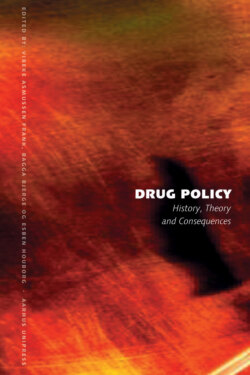Читать книгу Drug Policy - Группа авторов - Страница 11
На сайте Литреса книга снята с продажи.
Drug policy as governance
ОглавлениеPolicy is often associated with a deliberate plan of action worked out by public authorities, enterprises or organisations in order to handle a state of affairs, which has become a matter of concern or something, which requires action. Policy can also be associated with individuals who develop particular ways to handle particular situations. For instance, dieting can be thought of as an individual’s policy with regard to eating. These ways of considering policy all involve a pre-established player – public authority, enterprise, organisation or individual – developing a plan of action. However, policy can also be thought of as the effect of an association of different players joining forces as stakeholders in the management of some state of affairs because they are concerned about it, or because they are called upon by others to handle it. In this case policy cannot be attributed to a particular player, but has to be seen as an effect of the interaction of a multiplicity of players, who deploy a number of methods, techniques and forms of knowledge in order to control or manage a state of affairs (Hunt & Wickham 1994; Dean 1999). This is, in other words, a conception of policy which is well suited to the analysis of some of the new drug policies ‘beyond the state’ (Rose & Miller 1992) which we have described above. To understand policy in terms of governance means to look at how policy comes about irrespective of who is involved in developing and carrying out this policy. Policy as the effect of the interaction between a heterogeneity of different players is nothing new. The way we define and handle things like poverty, unemployment, crime or drugs and drug use has often resulted from such associations and interactions (as Jepsen’s and Houborgs’s contributions to this volume show). However, it has been argued that owing to increasing societal complexity and differentiation non-governmental players are becoming increasingly involved in the management of public issues and problems. According to this perspective, policy is increasingly something, which is developed by networks of players who come from and interact across different sectors of society, blurring the distinctions between states, market and civil society (Kooiman 1999).
To think of policy as a deliberate plan of action involves – as mentioned above – a state of affairs coming to the attention of one or more players as something which requires action. This is often the case when established ways of thinking, talking and acting become problematic because they are confronted with something which they are not immediately able to handle (see Houborg in this volume). But before such a denaturalisation occurs, the policy of handling drug problems, for instance, can be more or less tacitly embodied in the social and material infrastructure of society. This means that policy should not only be analysed as something coming from the outside, but also as something which can be embodied in the behaviour and world views of the players involved as well as in the social organisation of institutions like treatment centres and the various methods and techniques used. When new organisational or administrative structures or new technologies and methods are introduced in a system, the possible field of action (Foucault 1982) of the people who work there is altered (see Bjerge in this volume). If ‘empowerment’ is one of the dominant ideological elements of public substance-abuse treatment policies, it is likely that both the treatment staff and even the drug users will be affected by it in their everyday lives. Even if public practitioners do not agree with the dominant policy, they still have to relate to it because it is inscribed in daily procedures such as action plans and demands for empowerment-oriented treatment in the organisation. In short, specific policies determine the scope of their possible actions in the field. Implicitly, this will sustain the social order, which a certain policy tries to set up. In this perspective, when we study drug policy we should not merely see it as a set of rules and regulations, but also as an expression of an underlying rationale and as a wish to govern.
